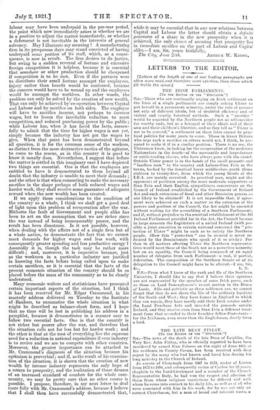LETTERS TO THE EDITOR.
[Letters of the length of one of our leading paragraphs are often more read,und therefore more effective, than those which fill treble the space.] THE IRISH PARLIAMENTS. (To me EDITOR OF THE " SPECTLTOR."] Sin,—Those who are continually urging an Irish settlement on the lines of a single parliament are simply asking Ulster to put herself in a permanent minority, under the rule of persons not only of different ideals, but of doubtful efficiency and of violent and cruelly fanatical methods. Such a " sacrifice '' would be regarded by the Northern people not as self-sacrifice for worthy ends, but as a. betrayal of their ideals and of their own and their children's liberties; and as they tell us "Ulster is not to be coerced," a settlement on these lines cannot be prac- tical politics for many years to come. Those in Great Britain who urge such a sacrifice on. others would not, I think, be pre- pared to make it if in a similar position. There is no use, the Ulstermen know, in looking for the co-operation of the moderato Nationalists in the South—of the mercantile and large-farmer or cattle-trading classes, who have always gone with the crowd. Outside Ulster power is in the hands of the small peasants and "landless men" in the country and Labour-Sinn Fein in the towns, backed by the fanatical lower middle-class youth (from eighteen to twenty-five), from which the young bloods of the I.R.A. are mainly recruited. As practical men, might not the opponents of partition amen the more moderate supporters ot Sinn Fein and their English sympathizers concentrate on the Council of Ireland established by the Government of Ireland Act and such extensions of fiscal and other Dominion powers as are likely to be obtained? It is not impossible that, if agree- ment were achieved on such a matter as the extension of the powers and position of the Council, the Act might be amended without waiting for the assembling of a Southern Parliament; and if, without prejudice to the eventual establishment of the All Ireland Parliament provided for in the Act, the Council became in large measure the Legislature of a united Ireland (with pos. sibly a joint executive in certain national concerns) the "pro- tection of Ulster" might be such as to satisfy the Northern people. (How this " protection " can be secured is never in- dicated by the Dominionists who speak of it so airily.) For then in all matters affecting Ulster the Northern representa- tives would meet those of the South not as a powerless minority but on an equality, the Council being composed of an equal number of delegates from each Parliament—a real, if partial, federation. The composition of the Southern Senate or of its delegation to the Council might have to be altered.—I am, Sir,
L. N.
P.S.—From what I know of the rank and file of the Southern Unionists, I should like to say that I believe their opinions are not represented by the speeches of some Irish peers, such as those on Lord Donoughmore's recent motion in the House of Lords. Able and patriotic as these noblemen are, we cannot forget that they do not share the life of the ordinary loyalists of the South and West; they have homes in England to which they can repair, they have mostly sold their Irish estates under the Land Purchase Acts and invested the proceeds outside Ireland, and they receive even from Sinn Fein a different treat- ment from that accorded to their humbler fellow-Protestants- for the Irishman, even more than the Englishman, dearly loves a lord.










































 Previous page
Previous page